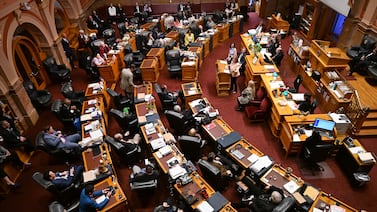Sign up for Chalkbeat Detroit’s free newsletter to keep up with the city’s public school system and Michigan education policy.
A group of 21 Democratic attorneys general has filed a lawsuit against the Trump administration aiming to stop the mass layoffs at the U.S. Department of Education.
The lawsuit comes days after the department announced it would cut its workforce nearly by half by the end of the month, a massive reduction that the U.S. Education Secretary Linda McMahon said is a first step toward eliminating the department.
The layoffs represent President Donald Trump’s hostility to the Education Department, which he recently called a “big con job” and has promised to eliminate. As a matter of law, only Congress can eliminate the department. McMahon said the staff cuts reflect her department’s “commitment to efficiency, accountability, and ensuring that resources are directed where they matter most: to students, parents, and teachers.” But such deep cuts could leave the department unable to provide the services it has previously performed.
That has raised deep concerns among parents, educators, and advocates, which the state attorneys general are highlighting in their lawsuit. The suit states, for example, that the layoffs this week have led seven regional offices of the department’s Office for Civil Rights — including in Chicago, New York City, and Philadelphia — to “have been closed down entirely.”
Michigan Attorney General Dana Nessel, who is among the 21 state law enforcement officials who filed the suit Thursday, said in a statement that the lawsuit’s purpose is to “stop the targeted destruction of this critical federal agency that ensures tens of millions of students receive a quality education and critical resources.”
The lawsuit says the layoffs “are an effective dismantling of the Department,” and that decision to make the staff cuts “leaves the nation rudderless to provide the necessary funding, support, and enforcement that all 1.4 million Michigan students rely upon,” Nessel said.
“It’s dangerous, reckless, and unacceptable,” Nessel said.
Other attorneys general who filed the lawsuit shared similar sentiments.
“This evisceration of the agency will harm Coloradans, undermine our education system, and create chaos,” said Colorado Attorney General Phil Weiser. “And it is plainly unconstitutional, as only Congress can lawfully dismantle the department that it created or shut down services it has required the federal government to fund.”
Nationally, Nessel said, U.S. Department of Education programs serve over 50 million K-12 students. In Michigan, the federal programs serve 1.4 million students. She noted that the 212,000 students with disabilities and the 681,000 Michigan students from low-income homes “are some of the primary beneficiaries of DOE services and funding.”
The lawsuit received support from Michigan State Superintendent Michael Rice and Pamela Pugh, the president of the State Board of Education.
“The slashing of staff at the U.S. Department of Education is an attempt to circumvent the authority of Congress regarding the protections of vulnerable children,” Rice said in a statement. “It is an outrage that, if unstopped, [the cuts] would have profound adverse impact on children’s education and supports across the country, as cuts at the U.S. Department of Education foreshadow cuts to education funding for thousands of districts and millions of public school children across the country.”
School districts nationwide are already bracing for cuts to federal funding that supports schools.
Last month, for example, the U.S. House of Representatives adopted a resolution that could mean 12 million students no longer automatically qualify for free meals. The resolution also calls for the House Committee on Education and the Workforce to cut spending by $330 billion over the next 10 years, although Republican proposals to reach that number have focused on higher education.
Nikolai Vitti, superintendent of the Detroit Public Schools Community District, said at a school board meeting Tuesday that education leaders are anticipating a 25% cut. But it’s unclear whether that will be an across-the-board cut to federal programs or cuts to certain programs.
Nevertheless, he told board members the district is already beginning to prepare for various scenarios. More than 30% of the district’s annual budget relies on federal funding.
“Unfortunately, there’s a lot to be concerned about, but there are more questions than answers,” Vitti said.
Nessel and Weiser filed the lawsuit along with attorneys general for Arizona, California, Connecticut, Delaware, Hawaii, Illinois, Maine, Maryland, Massachusetts, Minnesota, Nevada, New Jersey, New York, Oregon, Rhode Island, Washington, Wisconsin, Vermont, and the District of Columbia.
The lawsuit names as defendants McMahon and Trump in their official capacities, as well as the Education Department.
Lori Higgins is the bureau chief for Chalkbeat Detroit. You can reach her at lhiggins@chalkbeat.org.






